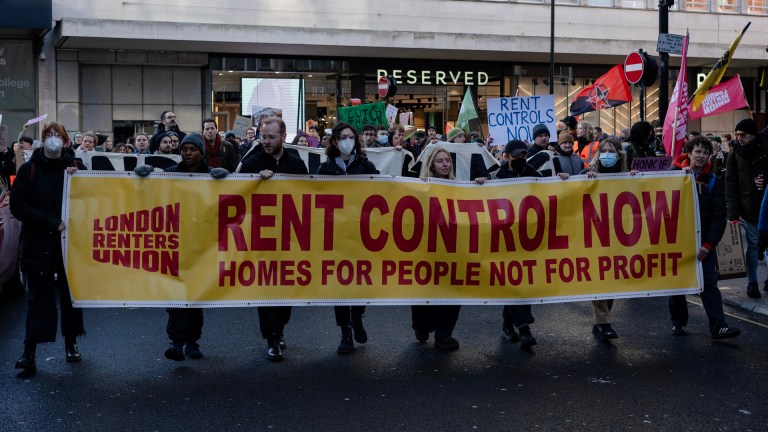Matthew Pennycook, Labour’s shadow housing minister, accused Gove of caving in to Tory backbenchers who have opposed the bill.
“Rishi Sunak and Michael Gove have chosen once again to put the interests of party management ahead of what is right for the British people,” said Pennycook.
“After years of delay, private renters have every right to be furious at the watering down of the vital protections the Tories promised them.”
The Renters Reform Bill was first introduced to parliament last May but has since made slow progress amid speculation it has faced opposition from Conservative backbench MPs.
Young’s letter said he had listened to the views of MPs and the sector before proposing amendments, in particular Conservative MPs Anthony Mangall and Andrew Lewer, chair of the all-party parliamentary group on the private rented sector.
He added that the changes have “the support of main landlord groups”.
There is no reference to the views of pro-renter groups in Young’s letter and the amendments have sparked accusations that the government has bowed down to pro-landlord lobbyists.
Tom Darling, campaign manager at the Renters’ Reform Coalition, called for significant changes when the bill reaches the House of Lords and said that the legislation risks being worse than the current status quo.
“So now we see the price the government has paid in their Faustian bargain with the landlord lobby,” said Darling.
“Selling renters down the river with concessions that will put off the vast majority of renters from feeling the benefits of these reforms indefinitely, promising to reduce the burdens on landlords to meet licensing standards, and locking tenants in unsafe and unsuitable housing.
“The government’s flagship legislation to help renters is fast becoming a Landlord’s Charter – watch as landlord groups today declare victory now having exacted a significant toll on this policy in exchange for their support.
Ben Twomey, chief executive of Generation Rent, added: “Instead of appeasing a few landlords, the government should focus on preventing homelessness. The best ways to do this would be to give renters four months notice rather than two when we are evicted, while making sure we can’t be kicked out within the first two years of a tenancy if we stick to the rules.”
Polly Neate, chief executive of Shelter, said: “It’s cowardly that the government would rather betray renters than stand up to a minority of MPs hell-bent on browbeating them into watering down the Renters Reform Bill.”
Crisis chief executive Matt Downie said the bill does improve prevention measures on homelessness but must go further to protect tenants and support responsible landlords.
“There has been positive movement on homelessness prevention measures in this bill, which would see households still being supported after eviction, which we very much welcome,” said Downie. “But with the bill still not published and continued uncertainty over ending no-fault evictions, this situation continues to cause anxiety for millions of renters across the country.
“The levelling up minister is correct – it’s vital that the Renters Reform Bill protects tenants, prevents homelessness and supports responsible landlords, but there is more it needs to include for it to achieve this.”
Ben Beadle, chief executive of the National Residential Landlords Association said the changes to the bill would bring “balance” between landlords and tenants.
But both sides of the argument agree on the need for the government to bring the new legislation into law at pace.
“All the rumour, speculation and off-the record briefings about the future of the bill has caused a huge amount of concern and uncertainty for tenants and responsible landlords,” said Beadle.
“The government has a mandate to end Section 21 repossessions. Our focus has been on ensuring that the replacement system works, and is fair, to both tenants and responsible landlords. The changes being proposed would achieve this balance.
“Ministers now need to crack on to ensure the bill can proceed with the scrutiny it deserves.”
A government spokesperson said: “Our landmark Renters (Reform) Bill will deliver a fairer private rented sector for both tenants and landlords. It will abolish section 21 evictions – giving people more security in their homes and empowering them to challenge poor practices.
“The bill must strike the balance between delivering security for tenants and fairness for landlords. We have listened to feedback from landlord and tenant groups and from MPs, and will bring amendments forward at Commons Report Stage after Easter recess.”
The Renters Reform Bill was first revealed in June 2022 to deliver on the government’s promise to end no-fault evictions, which have been accused of driving homelessness.
It’s now five years since the Conservative government, then led by Theresa May, promised to end no-fault evictions.
With record-high rents, the private rented sector providing a home for more households over the last couple of decades and suffering more quality issues than other types of housing, the Renters Reform Bill is intended to give tenants more power, security and stability.
That involves introducing measures such as a decent homes standard, a dedicated private renting ombudsman to resolve complaints as well as protecting the right to have a pet and preventing discrimination against tenants on benefits or with children.
The bill was finally introduced to parliament in May 2023 but progress has been slow since then.
The bill is still awaiting its report stage in the House of Commons and it must still also face scrutiny across five stages in the House of Lords before becoming law.
Do you have a story to tell or opinions to share about this? We want to hear from you. Get in touch and tell us more.









